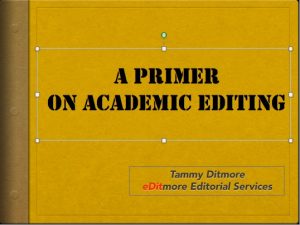Freelance editors can find many opportunities to work with academic writers and publications. But if you don’t have multiple advanced degrees, you may wonder if you have anything to offer a scholarly writer.
Or you may be reluctant to tackle academic projects because you find the writing exasperating and mystifying. If you’ve been passing up academic job listings for those reasons, I invite you to sign up for the webinar I’m leading on Thursday, Sept. 29, through the Editorial Freelancers Association.
to tackle academic projects because you find the writing exasperating and mystifying. If you’ve been passing up academic job listings for those reasons, I invite you to sign up for the webinar I’m leading on Thursday, Sept. 29, through the Editorial Freelancers Association.
A Primer on Academic Editing
In the webinar, I plan to provide some insight into the world of academic writing and writers. And I want to share a few tricks I’ve learned over the years so that you can approach scholarly work with more confidence.
The webinar will address questions such as:
- How is academic writing/editing different from other types of writing/editing?
- Why do academics write the way they do?
- What should editors do when working with academic materials?
- What should editors NOT do?
- What do you need to know to get started?
- Where can you look for academic editing work?
 Specialized subject knowledge is always helpful for academic editors — particularly in the hard sciences or esoteric fields like philosophy. But most editors don’t need PhD-levels of subject-matter knowledge to help most PhDs produce better books or articles. Your knowledge of language and your writing skills may be just what the doctor ordered.
Specialized subject knowledge is always helpful for academic editors — particularly in the hard sciences or esoteric fields like philosophy. But most editors don’t need PhD-levels of subject-matter knowledge to help most PhDs produce better books or articles. Your knowledge of language and your writing skills may be just what the doctor ordered.
From Journalism To Academia
More than 20 years ago, I was able to transition from editing for daily newspapers to proofreading articles for scholarly journals without a trip through grad school. It was unnerving at first, but I eventually realized the skills that made me a good newspaper editor — especially my attention to detail and my ability to look for patterns — allowed me to be a good academic editor too. After proofreading a number of social science articles, I became quite adept at spotting errors in the presentation of statistical results — even though (or maybe because?) I have no real understanding of statistics.
Much of my work in the past two decades has been with academic writers and publishers, including Sage Publications, the Christianity and Literature journal, Baylor University Press, and Pepperdine University. In addition to my years of academic editing experience, I also have access to insider information: my English-professor husband, who provides up-close and personal glimpses into the often mysterious workings of an academic mind.
The webinar will be Thursday, Sept. 29, from 4-5 p.m. EDT; it’s $39 for EFA members and $49 for nonmembers. A recording of the session will be offered if you can’t make the live webinar, but you must register for the webinar in advance to get access to the recording. Sign up on the EFA Class Registration site (http://www.the-efa.org/eve/registration.php) before Tuesday, Sept. 27. While you’re on the registration page, take a look at the EFA’s many wonderful offerings on a variety of editing and writing topics.
If you’re planning to join the webinar, use the comments function here to let me know if you have any burning questions you would like me to tackle!

0 Comments